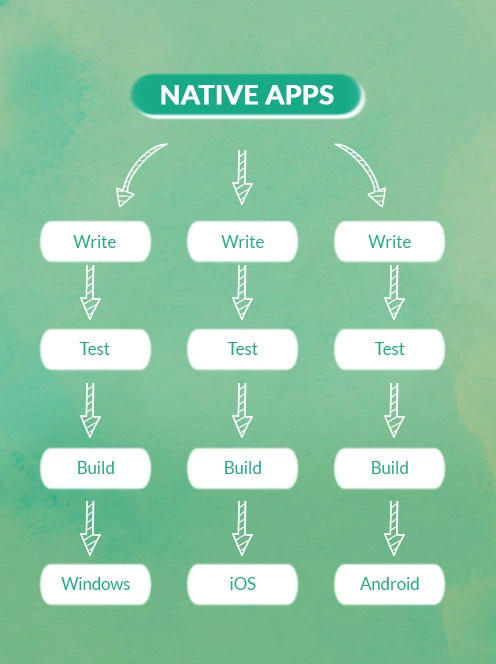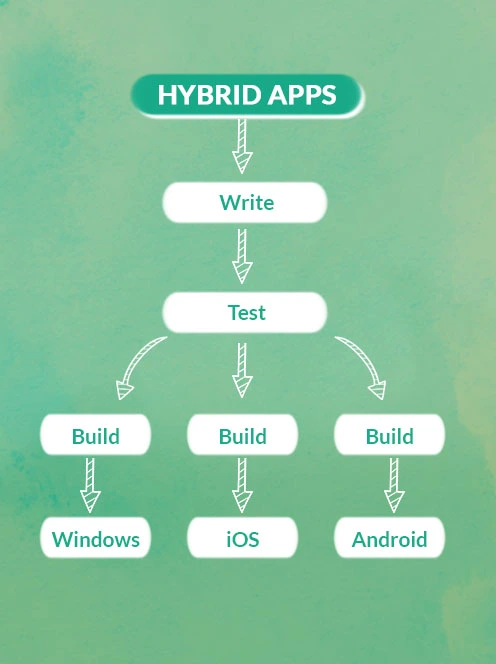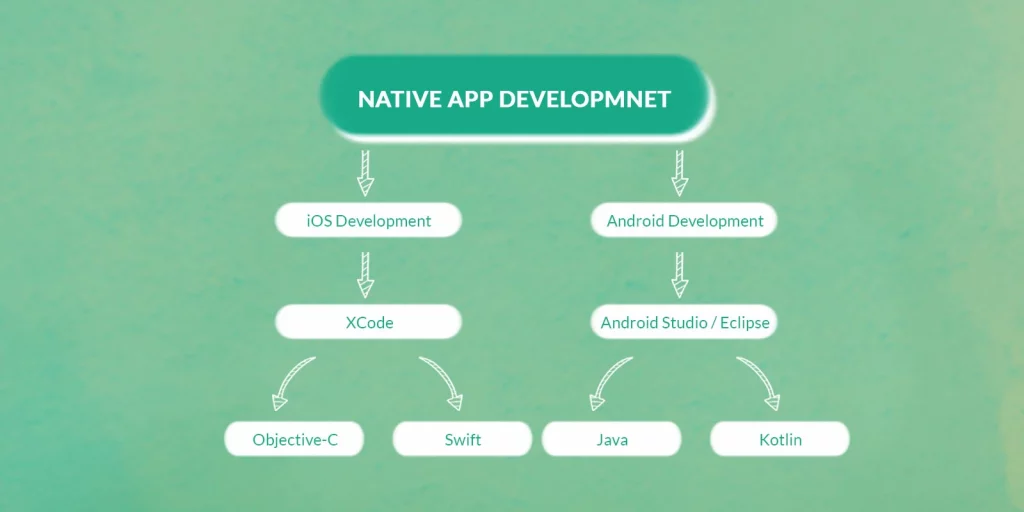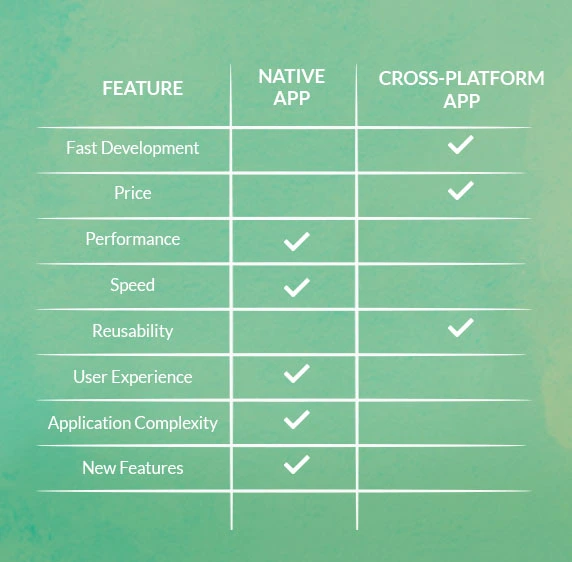Mobile applications are regarded as one of the most powerful business tools in the industry. They have become the new standard for connecting with customers. Mobile app development has also been on the rise at VentureDive as audience interests shift towards mobility, ease of use, quick access to information, and work on-the-go.
This is backed by the mobile industry stats, such as the smartphone shipment volume is expected to touch 1.65 billion in 2022, with the number of users crossing the 3 billion mark the very same year. This growth is exponential and is not expected to slow down anytime soon.
It is clear as day that companies must adopt mobile development if they wish to accelerate their journey to growth. Having a strong mobile presence is no longer an option for businesses – it’s mandatory if they wish to stay relevant in the ever-evolving industry.
With more than 4.4 million apps on Apple Appstore & Google Play Store, it’s essential to choose a platform, first and foremost, if you’re looking to launch your own app. Choosing between native or cross-platform app development is one of the most important decisions to make.
My goal, in this blog, is to focus on the critical differences between Native and Hybrid Apps. You’ll learn the pros and cons of both approaches and which one almost always leads to a better customer experience for your users. If you are going to opt for mobile development, the first thing you need to ask is whether you will build a native app or a hybrid app.
Native vs. hybrid mobile development: what’s the difference?
Native app development is centered around designing mobile apps specific to a single platform, like iOS or Android. These apps are built with programming languages and tools that are specific to a particular platform. I have talked about some frameworks and languages that we commonly use for building native apps at my organization, below.
Native apps

- iOS apps
iOS applications are created by Apple Inc. and use Objective-C or Swift as a programming language in native iOS app development. Swift is popular because it’s general-purpose, and takes a modern approach to application performance, security, and software patterns for mobile app design. iOS apps for iPhone, iPad, and Mac are created using Xcode, an Integrated Development Environment (IDE). - Android apps
Android applications are designed by Google and use Java or Kotlin programming language for native app development. Java is a commonly used programming language used by more than 9 million Android app developers, globally. The benefits of Java are that it’s object-oriented, robust, and user friendly. However, in recent years, Kotlin is gaining more popularity in native mobile development. Android apps for touch screen devices are built using an IDE called Android Studio.
Hybrid apps

Can iOS and Android apps work together? Unfortunately not, this means that native Android apps won’t work on iOS phones and vice versa. Cross-platform development involves creating an app that works on multiple platforms without needing any changes to its core architecture – in essence, they are called hybrid apps.
Using the cross-platform or hybrid approach, you can compile the code and execute it on multiple platforms. Imagine, the code is written once, and the final product can be run on iOS and Android. These apps are developed for multiple platforms such as Android and iOS using a single code base, using tools like React Native, Xamarin, and Flutter.
Understanding native & hybrid apps


Pros & cons of native vs. hybrid mobile development
Both hybrid and native approaches to mobile development have their own strengths and weaknesses that companies must keep in mind when embarking on their journey to becoming mobile-first.
At VentureDive, we develop both kinds of apps depending on the use case. For instance, if our client’s (let’s say they are a Fintech startup) target audience are the low-income group, chances are that there would be more Android users within that group as opposed to iOS users. So why make a hybrid app? A native app for Android would work better, and it’ll save time as well as cost.
Depending on your target audience and use case, you can easily decide the best approach to app development for you. Both approaches, native & hybrid, have their own pros and cons. I have listed the advantages & disadvantages of both, below.
Native app development
Advantages
- They are built with a native framework so platform-specificity allows them to offer fast and smooth performance.
- Native apps are interactive, natural, and run more smoothly in terms of user actions.
- Native development allows developers to access the core features of the selected operating system.
- Native apps follow specific UX/UI standards for creating Android or iOS apps, making it more straightforward for users to understand and navigate the apps.
- A native toolset allows the developers access to core features like camera, location services, etc. without the involvement of any third-party interference.
- Native apps can be more secure for various reasons like the more straightforward implementation of two-factor authentication, certificate pinning, and access to built-in security features like TouchID.
- Native apps tend to be more maintainable and scalable, thanks to the flexibility in resources management and the available tools.
- Native apps receive complete support from app stores. The process of publishing your program in stores is as easy as possible, which is understandable as native app features perfectly meet all their requirements.
- Native apps are built for particular platforms, so they dominate the app stores of all platforms.
Disadvantages
- Native apps are more expensive to build unlike web or hybrid apps.
- Native apps use difficult programming languages that required experts of specific technologies and programming languages for each mobile team.
- Android apps will not run on the iOS and vice versa, so every platform you choose has to work with the different codebases to develop an app.
- Native app development requires solid knowledge, expertise, and experience over respective app platforms.
- Native apps are OS-specific so they require more time to be developed.
- Writing applications for multiple platforms naturally increases the size and cost of a development team.
- With different codebases, it is challenging to release the same features on all platforms simultaneously.
- Longer development cycles.
- Native apps are not an excellent choice for simple applications.
Hybrid app development
Advantages
- One of the most significant pros of a hybrid app is the economic cost of development.
- Instead of having multiple teams, you’ll need only one team to build a cross-platform app.
- A hybrid app can be built just once and published on both iOS and Android stores.
- Due to single codebase hybrid apps are typically much quicker to build as compared to native apps.
- Cross-platform app developers do not need to learn multiple programming languages, frameworks, and technologies before creating their apps.
- It’s generally simpler to maintain and update hybrid technology than native app technology.
- A single codebase of the app is created with cross-platform development.
- The application logic works the same on all platforms, so developers don’t have to do double work, which can significantly simplify the process of updating and enhancing your mobile services.
- A single codebase allows cross-platform applications to have an identical user interface on all platforms.
- Hybrid app development is less time-consuming than the native because developers don’t have to create a new codebase for each platform.
- Developers have to run a single cycle of development to create an app that runs on both platforms.
- Popular hybrid mobile app development platforms offer a range of frameworks and plugins that allow you to access features on the device, including gestures, photos, cameras, and contacts.
- Hybrid apps offer better customer experience and performance across different operating systems.
Disadvantages
- Apps developed using a shared codebase may fail to offer high performance and robust user experiences, unlike Native apps.
- Cross-platform apps cannot fully take advantage of native-only features provided by the operating systems due to inconsistent communication between the device native and framework non-native code.
- Cross-platform apps are slower than their native counterparts because they need additional abstraction layers and a bridge for communication between your code and the native code.
- It hasn’t been long since the advent of hybrid apps, which is why the code may not auto-generate across devices, especially when we try to accommodate different Android models.
- When a new OS version is released, hybrid developers would have to rely on third parties and frameworks for updates before designing an app on the latest OS.
- Hybrid apps involve more complex features and functionalities as compared to native apps.
- Every time Apple and Google releases a new feature for the iOS and Android platform, it takes some time for hybrid app developers to add support for the new feature.
- All third party libraries and SDKs may not work in sync with the development frameworks of cross-platform applications.
- The process of approving a cross-platform application in google or apple store may take a lot of time.
How to decide which platform to build your app on
There are a number of factors that play their part when it comes to choosing which platform to go with when developing your mobile app. Speaking from my experience of working as a mobile developer at VentureDive, I made a mind map of the factors that can influence your decision.
- Application complexity
Building an app that involves heavy processing or requires access to low-level APIs native development will be the right choice. If the app just displaying information fetched from the network, go with the native development. - Cost
If you have a limited budget to develop an app, then cross-platform is a perfect choice. But on the other hand, native apps are costly to build, but they provide high performance and user experience. - Development time
If you want to get an MVP app up as soon as possible, consider cross-platform development. A single development cycle is needed for an app to be released on multiple platforms. In the native app development, you have to work with the two versions of the app. - UI/UX
If you’re looking for beautiful visuals and experience, the answer lies in native development. Because in the native app development, developers have access to native UI components. Opting for cross-platform will significantly limit the UI/UX element of the app. - Purpose of the app
If you’re still verifying your ideas, then hybrid app development is a better option to start an MVP example and demonstrate your product in the market. - Features
Native apps can make use of the device’s native feature. Cross-platform apps cannot utilize native features because they have limited access to the API.
Wrap up
Lastly, to help you make a better-informed decision, I have created a table summarising the features you can leverage for each mobile development approach.

In today’s day and age, everybody is going mobile! If you’re still thinking whether it would be a good idea to develop one for your business, chances are it would be one of the best decisions you can make. Go for it! Dive into it head-first: do some research, set your audience, gather a list of requirements, create a prototype, test, and improve.
It would be a wise idea to start with a discovery workshop when creating your mobile app. Our experts can help you understand and map out the scope of your project, enabling you to deliver a robust and aesthetic business solution.
Excited to create your mobile app? Awesome!
Don’t forget to share this blog and help spread the awesomeness!







